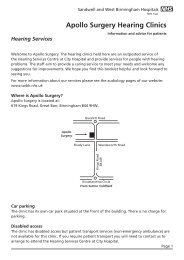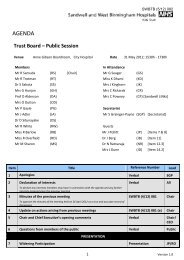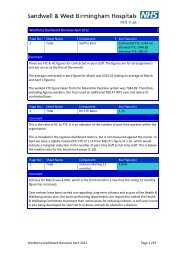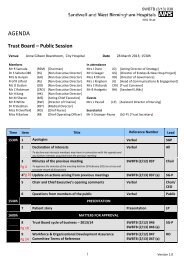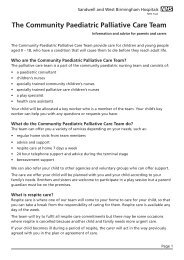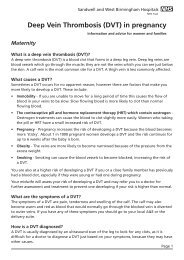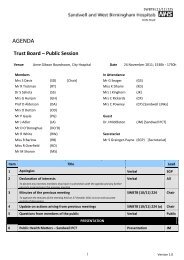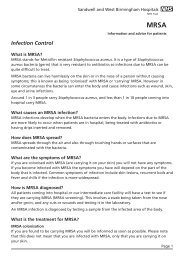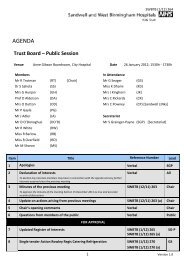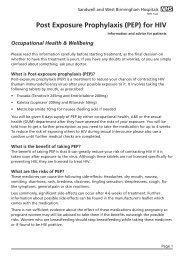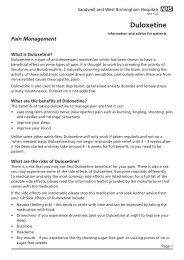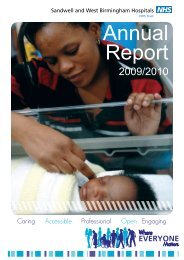Caring for your surgical wound - Sandwell & West Birmingham ...
Caring for your surgical wound - Sandwell & West Birmingham ...
Caring for your surgical wound - Sandwell & West Birmingham ...
Create successful ePaper yourself
Turn your PDF publications into a flip-book with our unique Google optimized e-Paper software.
Plastic surgery<br />
<strong>Caring</strong> <strong>for</strong> <strong>your</strong> <strong>surgical</strong> <strong>wound</strong><br />
In<strong>for</strong>mation and advice <strong>for</strong> patients<br />
What is a <strong>surgical</strong> <strong>wound</strong>?<br />
A <strong>surgical</strong> <strong>wound</strong> or <strong>surgical</strong> site is the cut/incision in the skin made by a surgeon to carry out<br />
a <strong>surgical</strong> procedure.<br />
Your <strong>wound</strong> may have been closed using sutures (stitches), dissolvable sutures, clips (staples),<br />
steristrips or medical skin glue. How <strong>your</strong> <strong>wound</strong> was closed depends on the type of surgery<br />
you have had.<br />
How do I care <strong>for</strong> my <strong>surgical</strong> <strong>wound</strong>?<br />
Wound closures<br />
• Medical glue - This does not need to be removed; it will lift off by itself when the <strong>wound</strong><br />
has healed. Do not pick the glue off.<br />
• Steristrips - You will be told when steristrips need to be removed and who by. If you have<br />
been told to remove them <strong>your</strong>self this should be done by lifting one end of the steristrip<br />
as far as the <strong>wound</strong> edge and then lifting the other end of the steristrip as far as the<br />
<strong>wound</strong> edge.<br />
• Sutures (stitches) and clips - Do not pull <strong>your</strong> sutures or clips. Dissolvable sutures<br />
will disappear themselves. Sutures, clips and staples that need to be removed will be<br />
removed by a nurse, usually between 5 and 21 days after surgery. You will be given an<br />
appointment <strong>for</strong> this.<br />
Dressings<br />
Your <strong>wound</strong> may be covered with a sterile dressing. The dressing is there to protect <strong>your</strong><br />
<strong>wound</strong>, absorb any leakage from it and help it to heal. It is very important that you do not<br />
remove <strong>your</strong> dressing until instructed to do so.<br />
Most dressings can stay in place <strong>for</strong> 1 week after surgery, but will need to be changed if<br />
the <strong>wound</strong> starts oozing and the dressing becomes wet from blood or other liquid. Do not<br />
change the dressing <strong>your</strong>self; contact the specialist nurses or the ward you were discharged<br />
from.<br />
Bathing and showering<br />
You will be advised when you can have a bath or shower after <strong>your</strong> operation. It is better to<br />
have a shower rather than a bath so that <strong>your</strong> <strong>wound</strong> doesn’t soak in water, as this can make<br />
the <strong>wound</strong> tissue softer and more likely to re-open and become infected.<br />
Be<strong>for</strong>e having a bath or shower cover <strong>your</strong> <strong>wound</strong> or dressing with a waterproof covering<br />
such as a plastic bag or rubber glove.<br />
You should not touch <strong>your</strong> <strong>wound</strong> and should always make sure you wash <strong>your</strong> hands after<br />
using the toilet.<br />
Page 1
<strong>Caring</strong> <strong>for</strong> <strong>your</strong> <strong>surgical</strong> <strong>wound</strong><br />
Plastic surgery<br />
In<strong>for</strong>mation and advice <strong>for</strong> patients<br />
Leaving hospital<br />
Be<strong>for</strong>e you are discharged from hospital the nurse will give you specific instructions about<br />
caring <strong>for</strong> <strong>your</strong> <strong>wound</strong>. You will also be given an appointment to attend the plastic surgery<br />
nurse-led clinic in the outpatient department. The nurse will review <strong>your</strong> <strong>wound</strong> and remove<br />
any <strong>wound</strong> closures necessary.<br />
Why is it important to follow this advice?<br />
It is important to follow the advice above, and any advice given to you by <strong>your</strong> nurse in order<br />
to prevent <strong>your</strong> <strong>surgical</strong> <strong>wound</strong> from becoming infected. If bacteria from the environment or<br />
<strong>your</strong> skin enters <strong>your</strong> <strong>wound</strong> it can cause a <strong>wound</strong> infection.<br />
A <strong>surgical</strong> <strong>wound</strong> infection can develop from 2 days - 3 weeks after surgery. Sometimes an<br />
infection can occur several months after an operation, but this is not very common. If you<br />
develop a <strong>surgical</strong> <strong>wound</strong> infection, how it is treated will depend on the severity of the<br />
infection. It may be treated by regularly changing dressings, with antibiotics or in some cases<br />
with further surgery.<br />
Some people are more likely to develop <strong>wound</strong> infections than others. Those at higher risk<br />
include people who:<br />
• smoke<br />
• have diabetes<br />
• have a condition or treatment that affects their immune system, such as leukaemia or<br />
chemotherapy<br />
• have had a major operation<br />
What are the symptoms of a <strong>surgical</strong> <strong>wound</strong> infection?<br />
The symptoms of a <strong>surgical</strong> <strong>wound</strong> infection are:<br />
• red or sore skin around the <strong>wound</strong> that is spreading<br />
• high temperature (38°C and above)<br />
AND any 1 of the following:<br />
• heat around the <strong>wound</strong><br />
• swelling around the <strong>wound</strong><br />
• a yellow or green coloured discharge (pus) from the <strong>wound</strong><br />
• unpleasant smell from the <strong>wound</strong><br />
• feeling unwell<br />
If you have any of these symptoms while you are in hospital please speak to the nurse<br />
looking after you. If you develop any of these symptoms after you have been discharged<br />
home please contact the specialist nurses or the ward you were discharged from.<br />
Page 2
<strong>Caring</strong> <strong>for</strong> <strong>your</strong> <strong>surgical</strong> <strong>wound</strong><br />
Plastic surgery<br />
In<strong>for</strong>mation and advice <strong>for</strong> patients<br />
How to care <strong>for</strong> <strong>your</strong> scar<br />
Scarring is an important part of the healing process after a <strong>wound</strong> has healed and it usually<br />
takes at least 1 year <strong>for</strong> a scar to settle. How <strong>your</strong> scar appears will depend on where it is on<br />
<strong>your</strong> body, <strong>your</strong> age and how prone you are to developing noticeable scars.<br />
Sometimes scar tissue can become thick and lumpy and restrict movement. Massaging <strong>your</strong><br />
scar 2 – 3 times a day with a non-perfumed moisturising cream such as E45, aqueous or<br />
Vaseline can help to reduce this. To massage <strong>your</strong> scar, apply firm pressure to it using the tip<br />
of <strong>your</strong> thumb and move in a circular motion so that the scar moves. Do not massage open<br />
<strong>wound</strong>s.<br />
If <strong>your</strong> <strong>wound</strong> re-opens, becomes sore or red, stop massaging and contact the plastic surgery<br />
specialist nurses.<br />
Instructions <strong>for</strong> patients who have had hand surgery<br />
• Use <strong>your</strong> hand <strong>for</strong> light activities if <strong>your</strong> doctor has advised you to do so.<br />
• Do not lift any heavy objects.<br />
• If you have been given a high arm sling, take <strong>your</strong> hand out of the sling a few times each<br />
hour to move <strong>your</strong> elbow and shoulder.<br />
• When you are not using <strong>your</strong> hand keep it elevated by resting it on <strong>your</strong> chest, near the<br />
shoulder on the opposite side.<br />
• Sleep with <strong>your</strong> hand elevated on pillows, higher than the level of <strong>your</strong> heart.<br />
If you have a cast or splint you will be given further instructions by <strong>your</strong> doctor, nurse of<br />
hand therapist.<br />
Contact details<br />
Plastic Surgery Specialist Nurses<br />
Contact the hospital switchboard on 0121 553 1831 and ask them to bleep the specialist<br />
nurses on 6288 or 6034.<br />
Lyndon 3 ward<br />
0121 507 3919<br />
Newton 2 ward<br />
0121 507 3351<br />
Plastic Surgery Consultant’s Sectaries<br />
0121 507 3455 (Mr Khanna)<br />
0121 507 3939 (Mr Lahiri)<br />
Page 3
<strong>Caring</strong> <strong>for</strong> <strong>your</strong> <strong>surgical</strong> <strong>wound</strong><br />
Plastic surgery<br />
In<strong>for</strong>mation and advice <strong>for</strong> patients<br />
Further in<strong>for</strong>mation<br />
For more in<strong>for</strong>mation about our hospitals and services please visit our websites<br />
www.swbh.nhs.uk and www.swbhengage.com, follow us on Twitter @SWBHnhs and like us<br />
on Facebook www.facebook.com/SWBHnhs.<br />
Sources used <strong>for</strong> the in<strong>for</strong>mation in this leaflet<br />
• National Institute <strong>for</strong> Health and Clinical Excellence, CG74 ‘Surgical site infection:<br />
Prevention and treatment of <strong>surgical</strong> site infection’, October 2008<br />
• Journal of Community Nursing, ‘Wound management’, March/April 2011<br />
If you would like to suggest any amendments or improvements to this leaflet please contact the<br />
communications department on 0121 507 5420 or email: swb-tr.swbh-gm-patient-in<strong>for</strong>mation@nhs.net<br />
A Teaching Trust of The University of <strong>Birmingham</strong><br />
Incorporating City, <strong>Sandwell</strong> and Rowley Regis Hospitals<br />
© <strong>Sandwell</strong> and <strong>West</strong> <strong>Birmingham</strong> Hospitals NHS Trust<br />
ML3743<br />
Issue Date: June 2013<br />
Review Date: June 2015<br />
Page 4



